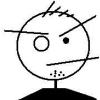During the strife of Sengoku period Japan, Lord Daigo strikes a bargain with the forces of darkness. In exchange for gaining temporal power beyond imagining, Daigo offers up his unborn child, whose body parts will be divided up between forty-eight demons.
The horribly disfigured infant is then, in proper Campbellian (Joseph, not Dave) fashion, placed in a basket and set adrift on upon a river. A kindly wise man discovers the child's basket on the river and raises the tenacious tot as his own. The child's adoptive father crafts prosthetic body parts, including a pair of arms which conceal a pair of sword blades, to replace the ones stolen by the demons, and aided by his natural tenacity and peternatural sensory powers, Hyakkimaru, as the boy is named, is able to function and fight as well as any able-bodied soul.
After receiving a tantalizing message from a mysterious voice from beyond, Hyakkimaru sets off on a quest to hunt down and slay each of the forty-eight demons, and by doing so, restore what was taken from him.
He also fights a pair of sandals possessed by the vengeful spirits of the unquiet dead...
It all happens in Dororo, the late "Godfather of Manga" Ozamu Tezuka's unfinished series from the 1960's. Though Dororo is one of Tezuka's lesser works, it still ranks light-years beyond the best efforts of most other creators, masterfully blending horror, humor, and action while managing to grapple with the requisite BIG SUBJECTSTM (the consequences of war, what it means to be "human") common to Tezuka's stories.
The first English language volume of Dororo (in a handsomely-designed trade paperback format) was recently released by Vertical, Inc, and can be obtained here for a reasonable sum. A live-action Dororo film, which takes a few liberties with the source material, debuted in Japan in 2007, with sequels planned for release sometime this year and in 2009.
For those seeking a more interactive experience and willing to overlook shitty in-came camera problems, Blood Will Tell, Sega's 2004 offering for the Playstation 2, not only provides players the opportunity to indulge their inner prosthetic-using samurai, but also posits a possible conclusion to Hyakkimaru's unfinished story.
Animetal Lady - Dororo No Uta (from Lady Marathon II, 2002) - A heavy metal rendition (featuring former Pink Lady Mitsuyo Nemoto on vocals) of the theme to the 1960's Dororo anime series.
The Supremes - Bits and Pieces (from A Bit of Liverpool, 1964) - Yeah, the Dave Clark Five hailed from North London rather than Scouser territory, but why quibble? Geography has never been a strong subject for the American people.
I have mixed feelings about this Motown foray into British Invasion territory. On one hand, it's represents a historic convergence of the two major musical currents of the era; on the other, the material is presented too damn straight and would have benefited by more of the stylistic "wall of sound" flourishes that embodied the Motown sound.
(Viva Bahlactus!)
Friday, May 09, 2008
Friday Night Fights: Sole Blade
Posted by
bitterandrew
at
11:45 PM
![]()
Labels: cover songs, Dororo, friday night fights, manga, soul, soundtrack
Subscribe to:
Post Comments (Atom)





0 comments:
Post a Comment